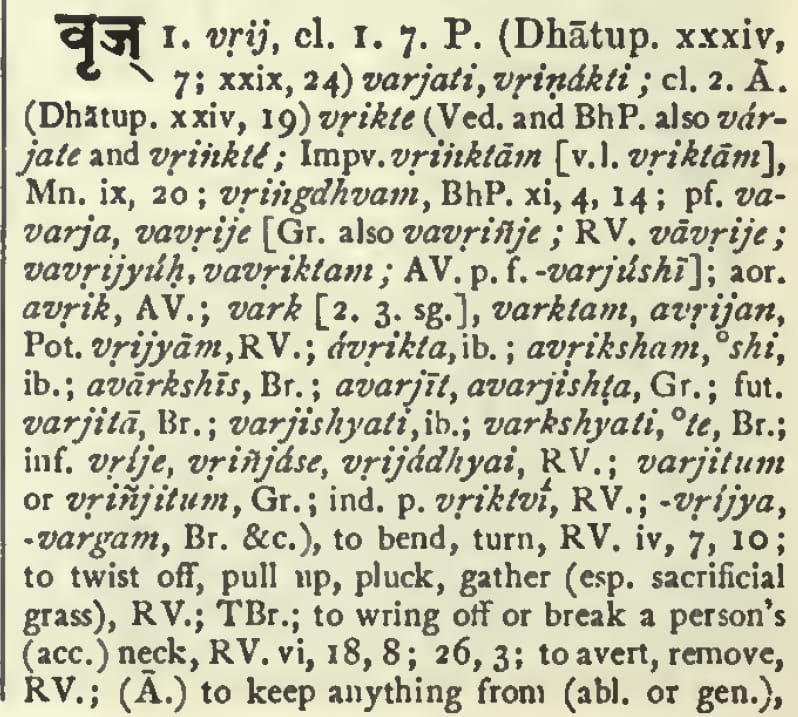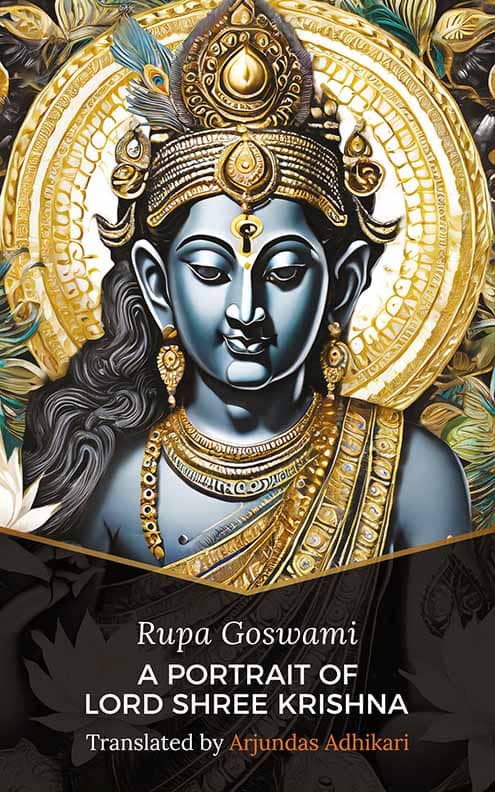
Insofar as so much attention is focussed on the issue of climate change, and the degree to which cows do or do not impact upon it, I would like to draw my reader’s attention to the significant role of cows in Rupa Goswami’s Sanskrit drama Vidagdha Madhava, (translated into English by Arjundas Adhikari as A Portrait of Lord Shree Krishna). Since Rupa Goswami’s very spiritual drama is, in the literal sense, a portrait of Lord Shree Krishna, and in that Krishna is universally recognised as “Govinda” – or “He who loves the cows,” it is hardly unsurprising that cows feature prominently in the play. ‘Go’ means cows and ‘vinda’ means searching for (and thereby keeping them in order), so “Govinda” designates His cow-herding inclination*. Given the fondness, devotion, respect and dependence that Lord Krishna and His community showed for the cows of the Vraja (see below) village, today’s industrial slaughter of them is by contrast, an indictment of the gross, insensitive and cruel side of today’s society.


Sanskrit-English Dictionary, Monier-Williams, 1899
The debate about milk’s ethical status as a foodstuff presumes that milk is the by-product of cruelty, but that is not always the case, and wasn’t the case in Krishna’s time when owning cows was synonymous with God-given prosperity, and the animal was reverentially loved. At that time, there was never any question of violence acted out upon a cow or a bull, who were accepted as mother and father figures respectively. Care was always taken in managing their welfare, the supply of milk managed in relation to that welfare.
Here are some references to cows and herds taken from my English transalation of Vidagdha Madhava (A Portrait of Lord Shree Krishna):
Krishna with His father surveying His herd of cows with satisfaction:
Could be the holy Ganges going to join Vrindavan’s river,
All gleaming crystal-white – a steady flow of bovine vigour!
Vidagdha Madhava, Act I
Krishna’s friend’s comment on how Krishna’s flute-playing is affecting His cows:
Amazing notes! Look at the cows, their situation’s helpless!
Soaking flowers in milk – my, are they lost in happiness!
Vidagdha Madhava, Act I
Krishna pretends to object to a personal request from the cowherd-girl, Lalita:
You foisting lady-matters on My companion and Me!
Our job’s watching our cows around the forest boundary!
Vidagdha Madhava, Act II
Krishna appreciates the autumn forest with His friend Madhumangala:
Autumn is a ravishing assembly of sound,
Teeming life – just look at that fine bull! Well, I’ll be bound!
There’s horns to ensure triumph in the contest for a cow!
Vidagdha Madhava, Act VI
The cowherd-girl Lalita’s comment on the effect of Krishna’s flute-playing:
Music forcing forest-flowers to blossom out of season,
And milk-cows, willy-nilly, empty udders in elation;
Brook of milk – look – streaming through the forest of Vrindavan!
Vidagdha Madhava, Act VI
Krishna admires His favourite bull:
Oh, here he is, friend – on your right – now this bull is the one!
He’s called Padmagandha – got the copper horns and neck-bell;
Ruddy hooves, pink eyes – look at that awesome tail, as well;
What d’you say? A hump like that? This snow-white bull’s the best one!
(both) Vidagdha Madhava, Act VI
*With regards to Krishna’s fondness for cows, cows are also very fond of Him. If Krishna was ever distracted by some amusement or other, the other cowherds had to ask Him to come back and control the herd because the cows would keep wandering off in search of Him. As a cowherd, Krishna’s job is locating and coraling cows. It might be noted that it has been suggested ‘Govinda’ may also be derived from ‘Gopendra’ (king of cowherds) since the prakrit version of ‘Gopendra’ is ‘Gov’inda’. The Indian sub-continent’s prakrit language (current 3rd – 8th century BCE) was derived from Sanskrit, and tended to drop Sanskrit ‘p’s.
Arjundas Adhikari

